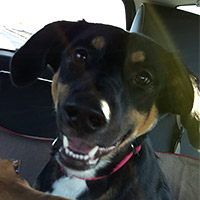“Early socialisation is absolutely vital to ensure a balanced and well-behaved adult dog — current statistics show that more young adult dogs are put down because of behavioural problems than die from the diseases we vaccinate against.”
– Source
Shortly after adopting Ellie, my vet instructed me to avoid high traffic areas like the park, unfamiliar dogs, puppy classes, and the dog park. I asked for how long and she said until the vaccination process was complete at 16 weeks or 4 months of age. Ellie was currently 2 months old so that meant for another 2 months I should limit her socialization. I am skeptical of this advice.
The rate of transmission for serious diseases among responsible dog owners (or well cared for dogs) seems to be very low whereas the consequence of avoiding socialization during this early critical period seems very high. In fact, of the many dogs I’ve come to know in my neighborhood over the past 2 years I don’t know of any that have died from illness. So you can avoid a low probability health risk for a possible high probability behavioral risk. In my opinion, that is not worth the trade-off.
Ellie met hundreds of dogs in those first 2 months before she was fully vaccinated. We were out every day for hours when I first got her because I wanted to make sure she had a wide range of experiences. It was a blast and I can’t imagine sacrificing those experiences just to avoid the low probability event of her getting sick. I will admit that, if it happened, I would have felt terrible, but that doesn’t change the math. The other important factor to consider is that, during those first few months, you’ll have more energy and patience, and be more intimately involved in your puppy’s life. If I would have waited, I might have been worn out and less patient because I was starting to deal with the harder side of training a puppy. Do not underestimate those early months and how critical they can be for both you and your dog.
With that being said, you need to use common sense. I did avoid some things like the dog park, doggy daycare, and puppy classes because I felt it increased the likelihood of transmission too much. I also avoided dogs that looked visibly ill or were dirty/rough looking. Don’t be afraid or embarrassed to decline socialization if you feel the other dog is sick or seems unfriendly. Pay really close attention, don’t let your puppy dig in the dirt as bacteria can live in it. Don’t let them eat trash and weird things off the ground. Don’t let them drink shared or dirty water. All these little things greatly diminish the probability of illness while still allowing you to socialize. You also need to remember that the vet has to give you “good advice”. If they tell you not to worry and then your puppy dies you may hold them liable, but it doesn’t mean they’re right. I’ve asked for training advice from them before and they don’t seem to know any better than anyone else. They’re not dog trainers. They don’t necessarily delve into the world of critical periods and optimized training. They ARE experts in health though and their advice should be considered, but ultimately you as an intelligent adult needs to weigh that with knowledge from other fields.
Lastly, there are a couple other important notes about early socialization. First, be cautious about people picking up your puppy. Ellie was nearly dropped once and actually dropped a second time. Fortunately she wasn’t injured, but people don’t understand that when you go to set a puppy down they try to wriggle out of your arms. That’s how both instances happened and I’ve seen it happen to other people with puppies. Only someone who has a puppy or recently had a puppy should be fully trusted. The second note is that puppies tend to frighten easily, especially at night. One instance sticks out in my mind when a friendly, but large Bernese Mountain Dog approached her at night. She squealed in fear and tried to get away. I’ve wondered if that event and others have contributed to her nervousness of night walks. If I were to do it all over again I’d be more cautious about how fast other dogs approach (to give her more time to feel comfortable). In the very early stages I probably should have just picked her up and held her while those dogs approached.
